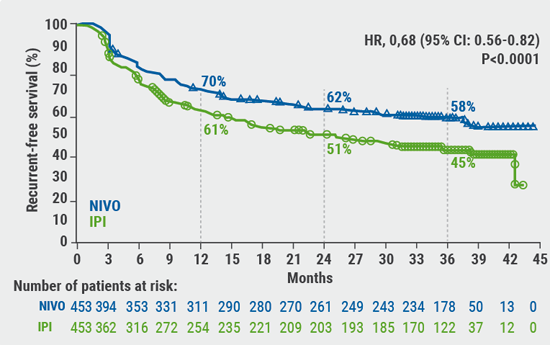The rationale behind the trial rose from the fact that BRCA-mutated tumours are deficient in homologous recombination that occurs during DNA repair, making them susceptible to both platinum and PARP inhibitors, such as veliparib. Patients were randomised 2:1 to receive oral veliparib at 120 mg twice daily or placebo on days 2 to 5, administered with carboplatin AUC 6 on day 1 and weekly paclitaxel at 80 mg/m2 on days 1, 8, and 15 in 21-day cycles. Patients discontinuing both carboplatin and paclitaxel without disease progression received blinded single agent veliparib at 300 to 400 mg twice daily or placebo. All patients had germline BRCA1/2 mutations and had previously received ≤2 lines of cytotoxic therapy for metastatic breast cancer. Investigator-assessed PFS served as the primary endpoint and secondary endpoints included overall survival (OS), clinical benefit rate (CBR), objective response rate (ORR), and PFS2.
Median PFS per investigator in 337 patients treated with veliparib plus chemotherapy was 14.5 months (95% CI 12.5–17.7) compared with 12.6 months (95% CI 10.6-14.4) in 172 patients receiving placebo plus chemotherapy (HR 0.71; 95% CI 0.57-0.88; P=0.002: see Figure). Duration of response was longer at 19.3 (95% CI 16.5- 23.3) months compared with 13.5 (95% CI 12.5-16.3) months, respectively (HR 0.70; 95% CI 0.54-0.90). PFS at 3 years was doubled with veliparib; the respective cohorts demonstrated 3-year PFS rates of 26% vs 11%.
Figure. BROCADE3 primary endpoint: PFS by Investigator Assessment.

© Véronique Diéras (provided by ESMO).
Median OS at 24 weeks was unchanged; 33.5 (95% CI 27.6-37.9) months with veliparib/chemotherapy compared with 28.2 (95% CI 24.7-35.2) months with placebo/chemotherapy (HR 0.95; 95% CI 0.73-1.2; P=0.67). Likewise, CBR (90.7% vs 93.2%) and ORR (75.8% vs 74.1%) were similar between arms. However, prolonged PFS2 was seen with veliparib (21.3 months; 95% CI 19.8-25.1) vs placebo (17.4 months; 95% CI 16.0-20.0) HR 0.76
Importantly, the addition of veliparib did not substantially alter the toxicity profile of chemotherapy. The most common ≥grade 3 adverse event occurring ≥20% of patients in the respective arms were anaemia (27% vs 17%), neutropenia (52% vs 50%), and thrombocytopenia (25% vs 15%).
- Diéras VC et al. ESMO Congress 2019. Abstract LBA9.
Posted on
Previous Article
« Interview with ESMO President Prof. Josep Tabernero Next Article
Liquid biopsy to decide the best treatment for NSCLC »
« Interview with ESMO President Prof. Josep Tabernero Next Article
Liquid biopsy to decide the best treatment for NSCLC »
Table of Contents: ESMO 2019
Featured articles
Interview with ESMO President Prof. Josep Tabernero
Breast Cancer
Triple negative breast cancer gets positive news: KEYNOTE-522 interim results
CDK4/6 inhibitors change landscape of breast cancer treatment: 2 studies
Veliparib-chemo combo prolongs survival without disease progression in some advanced breast cancer patients
Lung Cancer
Improved response rates without survival benefit with pembrolizumab in pretreated mesothelioma
Frontline ipilimumab/nivolumab improves OS in advanced NCLSC
First-line osimertinib significantly lengthens OS in NSCLC
Liquid biopsy to decide the best treatment for NSCLC
Melanoma
Long-term data from CheckMate 067
Adjuvant nivolumab provides benefit
Nivolumab+ipilimumab superior to monotherapy for melanoma brain metastases
GI Cancers
Preoperative chemotherapy for colon cancer
Nivolumab improves OS in advanced oesophageal cancer
Liquid biopsy identifies relapse in patients with colorectal cancer after surgery
In hepatocellular carcinoma, CheckMate 459 misses OS endpoint, but some interesting trends emerge
Heavily pre-treated GIST: ripretinib improves PFS
FGFR2+ cholangiocarcinoma: pemigatinib active as second-line treatment
IDH1+ cholangiocarcinoma: phase 3 results show improved PFS
Advanced colorectal cancer and BRAF mutations: triplet combination improves survival
Genitourinary Cancers
25% reduction in the risk of death in patients with nmCRPC treated with apalutamide
Enfortumab vedotin and pembrolizumab in advanced bladder cancer: initial results
PARP inhibition in selected patients slows progression on advanced prostate cancer
PFS extension with immunotherapy + chemotherapy in urothelial cancer
Third-line in mCRPC: CARD trial
Prostate cancer: spare radiotherapy after surgery
Novel mode of action for kidney cancer treatment
Gynaecological Cancers
Ovarian cancer patients benefit from combined maintenance therapy
Combination of PARP inhibition plus chemotherapy in ovarian cancer
PFS benefit with niraparib as first-line maintenance in ovarian cancer
CNS Tumours
Ceritinib in ALK+ NSCLC brain metastases
Solid Tumours/Pan-Tumour Data
Mixed data: AMG 510 in tumours with KRASG12C
DNA profiling of carcinoma of unknown primary should inform treatment
Larotrectinib: safe and effective in TRK fusion-positive tumours
Related Articles
November 26, 2019
Nivolumab improves OS in advanced oesophageal cancer

November 26, 2019
Adjuvant nivolumab provides benefit
November 26, 2019
Ceritinib in ALK+ NSCLC brain metastases
© 2024 Medicom Medical Publishers. All rights reserved. Terms and Conditions | Privacy Policy
HEAD OFFICE
Laarderhoogtweg 25
1101 EB Amsterdam
The Netherlands
T: +31 85 4012 560
E: publishers@medicom-publishers.com

